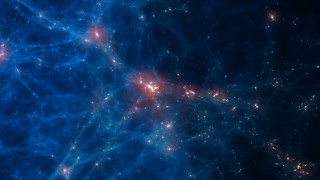Bibcode
Sampaio, V. M.; de Carvalho, R. R.; Aragón-Salamanca, A.; Merrifield, M. R.; Ferreras, I.; Cornwell, D. J.
Bibliographical reference
Monthly Notices of the Royal Astronomical Society
Advertised on:
7
2024
Citations
14
Refereed citations
9
Description
Galaxies infalling into clusters undergo both star formation quenching and morphological transformation due to environmental effects. We investigate these processes and their time-scales using a local sample of 20 191 cluster and 11 674 field galaxies from Sloan Digital Sky Survey. By analysing morphology as a function of distance from the star formation main sequence, we show that environmental influence is especially pronounced for low-mass galaxies, which emerge from the green valley (GV) with early-type morphologies before their star formation is fully suppressed. Using the galaxies' positions in the clusters' projected phase space, we examine the evolution of blue cloud, GV, and red-sequence fractions as a function of time since infall. Interestingly, the GV fraction remains constant with time since infall, suggesting a balanced flow of galaxies in and out of this class. We estimate that galaxies less massive than $10^{10}\,\rm {\rm M}_{\odot }$ spend approximately 0.4 Gyr in the GV. By comparing quenched and early-type populations, we provide further evidence for the 'slow-then-rapid' quenching model and suggest that it can also be applied to morphological transitions. Our results indicate that morphological transformation occurs at larger radii than complete star formation quenching. About 75 per cent of galaxies undergoing morphological transition in clusters are spirals evolving into S0s, suggesting that infalling galaxies retain their discs, while massive ellipticals are relics of early merger events. Finally, we show it takes approximately 2.5 and 1.2 Gyr after the delay time ($\sim 3.8 {\,\rm Gyr}$) for the population of low-mass galaxies in clusters to reach a 50 per cent threshold in quenched and early-type fraction, respectively. These findings suggest morphological transition precedes full star formation quenching, with both processes possibly being causally linked.
Related projects

Numerical Astrophysics: Galaxy Formation and Evolution
How galaxies formed and evolved through cosmic time is one of the key questions of modern astronomy and astrophysics. Cosmological time- and length-scales are so large that the evolution of individual galaxies cannot be directly observed. Only through numerical simulations can one follow the emergence of cosmic structures within the current
Claudio
Dalla Vecchia